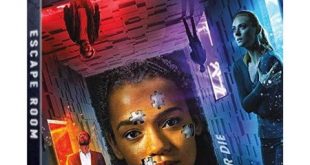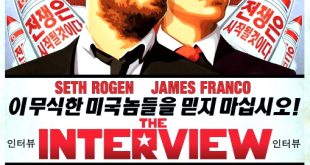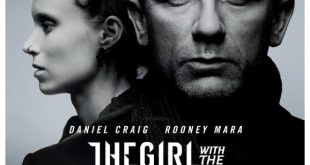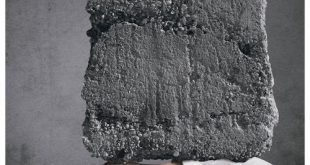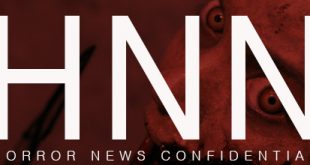Feature Interview with Steve Douglas-Craig, Senior Executive Coordinator & Story Analyst with Sony Pictures Worldwide Acquisition
 When did you realize that you had a passion for screenwriting?
When did you realize that you had a passion for screenwriting?
That passion was actually born of a love for storytelling in general. I started my career in the theater industry in Australia and have always been involved in various ways of telling stories whether it’s directing, writing, acting, street theater, any kind of performance live or recorded… even working as a backstage hand at an amateur theater at night allowed me to watch the audience watching the performance. It showed me how powerfully a story could penetrate when told right. In all seriousness, I found my way to writing for the screen through performing and working in the theater. But…
My love for screenwriting specifically grew from a love for movies and TV that I’d always had. When I attempted my first feature length script (the one that got me into the AFI Master’s program) I was immediately drawn to the visual power of story. Taking the seed of an idea or a quirky character and blowing it up into a visual story set a fire under me. Sometimes while working in the theater, I would run across a story and begin visualizing ways of making it a movie of series. I loved the idea of that kind of adaptation and writing so much it propelled me to seek Graduate studies; an immersion was needed and I definitely got it there. It’s in those programs where you really get a chance to bury yourself in writing and learning about writing. I was lucky.
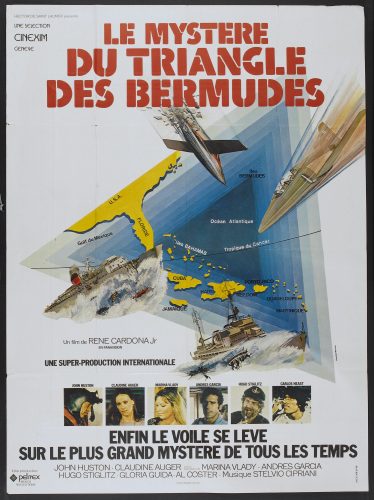 What was your favorite horror movie from your childhood… and why?
What was your favorite horror movie from your childhood… and why?
Well, I remember the first horror film that ever made an impact on me (actually more Sci-Fi than horror) was René Cardona Jr.’s 1978 film The Bermuda Triangle. There is a scene in that film that forced me to banish my plastic Santa Clause doll from my room at night for fear it would attack me… truly horrifying.
But I’d have to say my favorite horror film to this day is Friedkin’s ‘73 classic The Exorcist. The tension achieved in each and every frame of that film; in each and every character relationship still haunts. And I’ve seen it many times. It never gets old… it never gets less scary… never dates. The idea that an evil can infest us or our loved ones to the point of setting them against us is a theme I love to explore; literally and figuratively. The Exorcist ignited my love of the Possession horror sub-genre. When it’s done right (which is rarely) it can be terrifying.
As an adult and a screenwriter, how have your opinions changed about the horror genre?
As a screenwriter I always go back to the craft. Storytelling in any genre is more powerful when the medium is manipulated by those who have invested time in studying the craft of screenwriting and storytelling. Compelling three-dimensional, developed characters we care about subjected to horror scenarios will always draw us in… but it’s the diversity in sub-genres I find most fascinating. No other genre really experiences this kind of polarizing effect when it comes to favorite horror minutiae. For me, I’m not really a zombie guy; not really a horror comedy guy, but World War Z, Zombieland and 28 Days Later are all epic because of the structure of the stories and the development of the characters. You care.
Again it all comes back to the craft of storytelling rather than genre alone. Take any genre and put it under a microscope. It’ll hold up if that craft is tight. Not to say a little gore or gratuitous scare for those that need it can’t be inserted, but we have to care about those put in jeopardy… also Paranormal Activity (the first one) is a terrifying film because of what is NOT shown on screen. When you allow the imagination to create instead of spoon-feeding it… it will always conjure something more horrid. As a kid all I needed to banish a revered doll from my room was that one image… now I need a compelling story to hold my attention.
What is the most common misconception about writing a movie or television show?
I experience a great sense of relief when that first draft is in the can. You’ve battled your way through the Big Beat outline construction, rewriting that into an outline numerous times, turned it into a treatment of sorts (or extended outline) then dug in hard on constructing that first draft. So much so that it’s easy to see why a lot of people feel a first draft can be turned into reps, competitions, agents and managers with confidence. But it shouldn’t be. That’s a very big misconception – the first draft is never ready.
Over time everyone develops a process that best fits their style, but most if not ALL successful screenwriters start with the basics. You cannot throw out convention unless you understand their effectiveness from the beginning. For me the end of that arduous first draft journey is only the beginning. Good, clean well-crafted screenwriting is all rewriting. Reworking dialogue, focusing transitional points, page count and where your big beats fall inside that draft, carving into over-wrought description; it all leads to a smoother read and a more believable plot.
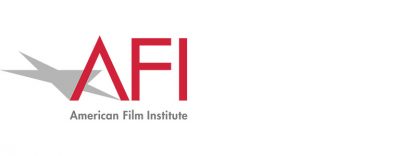 Let’s talk about ‘The New Screenwriter’. What made you create this website?
Let’s talk about ‘The New Screenwriter’. What made you create this website?
My time at the American Film Institute Conservatory here in LA was extremely cathartic. I ‘found’ myself as a writer thanks to a mentor who took me through my paces without coddling me. She was uncompromising, tough, and skilled and had clearly read your pages thoroughly when she came to class. Her feedback was honest, open and on point. I flourished inside her process of development (which was designed to mirror a real development process), and knew I wanted to create a similar experience for others someday (even teach at a college level myself). Not everyone gets to attend a Grad program for various reasons. So I wanted to take the joy, blood, sweat and tears I’d experienced back out to those who still have the drive it would take to do this crazy job. That’s what The New Screenwriter is. It’s not a random coverage site where you throw money at some agency or studio intern for a dime’s worth of feedback. It’s a place you can be coached in the creation of a screenplay; somewhere you could come and KNOW the guy reading your script, sculpting your outline or making suggestions for characters and storyline is who he says he is… who you’re paying to mentor you through what can be an arduous process; a teacher.
The New Screenwriter is a ‘menu-based’ website. So, if you already have an outline you’re happy with, we can start at the script stage. If you have a coffee-stained napkin with one single idea or character-type on it, we can start there. We’ve even created a place where more advanced Indie Producers looking for a polish or larger development or pitch-based work can go. In a lot of ways, The New Screenwriter is a reaction to the impersonal nature of coverage sites… an attempt to create a more personal, hands-on approach to learning the craft of screenwriting while also employing years of development executive and story analyst experience.
John August and his Scriptnotes podcast is also a great influence on me as a writer and someone who cares about writing. He has a tremendous insight into being a writer.
Not to give too much away, but what is a handy piece of FREE advice that you might give an up-and-coming horror writer?
Read, write, read, write, read some more; and not just screenplays. Read horror literature, short form, long form, graphic novels. Be well-rounded. Every day should have a reading-then-writing time set aside… even if you have to get up at 3:30am like I’ve done for years. I have two young children, a VO career, a studio job and now The New Screenwriter, so time management is essential if I wanna be a good dad, husband, writer and teacher. Time management is paramount to successful writing because 95% of that success is tied to the concept of hard work.
You know, studying the history of horror and its evolution as a genre has also been helpful. Explore movies from different time periods. Look at why they worked in their particular eras and what part of each zeitgeist they captured that made them effective; look at structure. Where are the scares placed? What made them effective in their placement? Also be aware that ‘horror’ is not one type… look to finding your niche inside sub-genre exploration. What you like to watch is probably what you should be writing.
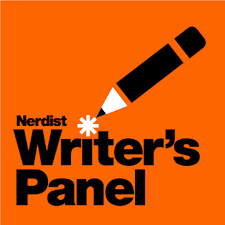 How important is networking in this industry?
How important is networking in this industry?
It is the single most important part of the next-step process once you’ve written that killer spec. It’s not necessarily who YOU know, but WHO knows you. Mixers are okay, but generally not productive in that you’re generally meeting the bottom rung of a large ladder.
There are many ways of building a network, but the biggest mistake I see all the time is a disingenuous attempt at creating a large network. Superficiality. Desperation. It’s a common smell in Los Angeles and the industry in general. No one responds to it. No one will respond to pushy people looking to drop a script in their lap. I’ve never seen it work. Quality not quantity. All you need a few champions with influence. My suggestion would be to become one of them while you’re writing. Get a job in the industry… and if you don’t live in LA, at least explore visiting a couple of times a year. Story Expo at the LA convention center’s always a rush. Also the Writer’s Guild West (and East) sometimes has open panels. Film festivals are another way to meet people not to mention podcasts like The Nerdist Writer’s Panel and John August’s Scriptnotes who will sometimes advertise gatherings that you can attend. There are also a handful of reputable competitions out there. Not many. Most are money pits. But Final Draft Big Break, Austin Film festival, and The Nicholls Fellowship will reward a great piece of writing the way it should be rewarded.
What is one of the hardest challenges that you have personally faced while writing a script?
I think conjuring the discipline to sit down and write everyday no matter what is a giant hurdle; Malcolm Gladwell’s 10,000 hours theory. Having talent isn’t hard work; putting that talent into practice day in and day out is the blood, sweat and tears of success for me. It’s the only thing (besides constant reading of new material) that’s improved my writing in every way.
For many years I’d wake up at 4am 6 days a week and write for three to four hours before starting my regular gig as a story analyst for a major studio. I knew that if I didn’t beat back the urge to ‘snooze’ that alarm early on I’d not reach any goals I set for myself. Find that time and make it a ritual; a necessity… it can make or break. So I did.
What has been your proudest accomplishment from writing?
Apart from getting into the AFI Conservatory (and graduating!), I’d have to say completing the first draft of my first screenplay (pre-AFI). At that stage I only had a love of film & TV, and my theater background experience. But I wanted to sit in that lonely dark room so much. I dove into reading books on structure and watched films that had the same tone I was writing for. It was a slog, but eventually I wrote FADE OUT. It was an amazing feeling! The same feeling that spurred me on to apply to grad school; that feeling that I want to be able to share and re-create inside The New Screenwriter experience. I want to be able to show people a path to letting their stories flourish under the harsh glare of the same structure used by professionals all over the world. Recreating the AFI development process is what this venture is all about.
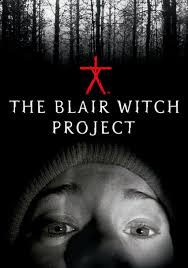 What other projects are you currently working on?
What other projects are you currently working on?
I’m always working on more than one thing at once until one catches me completely. There is never really a time where I am NOT writing! It’s the life. I love it. Always will.
I’ve just finished a new horror feature script titled The Gruesome. Won’t give too much away, but it’s a past-life possession horror set in Upstate New York. The wonderfully talented Ed Sanchez (BLAIR WITCH PROJECT, EXISTS, LOVELY MOLLY) is currently reading with an eye to directing it. Fingers crossed.
Also have a new feature titled Tow that the director of the two CRANK movies and GHOSTRIDER sequel is attached to direct, so we’re deep in the deal making phase on that one.
Otherwise, I have two pilots I’m polishing and the bones of another feature to put meat on. Never stops.
Thanks for the time, Mike and for those great questions.
SDC
Email: sdc@thenewscreenwriter.com
Website: https://www.thenewscreenwriter.com/
Instagram: @panic_writer
 Horror News | HNN Official Site | Horror Movies,Trailers, Reviews
Horror News | HNN Official Site | Horror Movies,Trailers, Reviews

